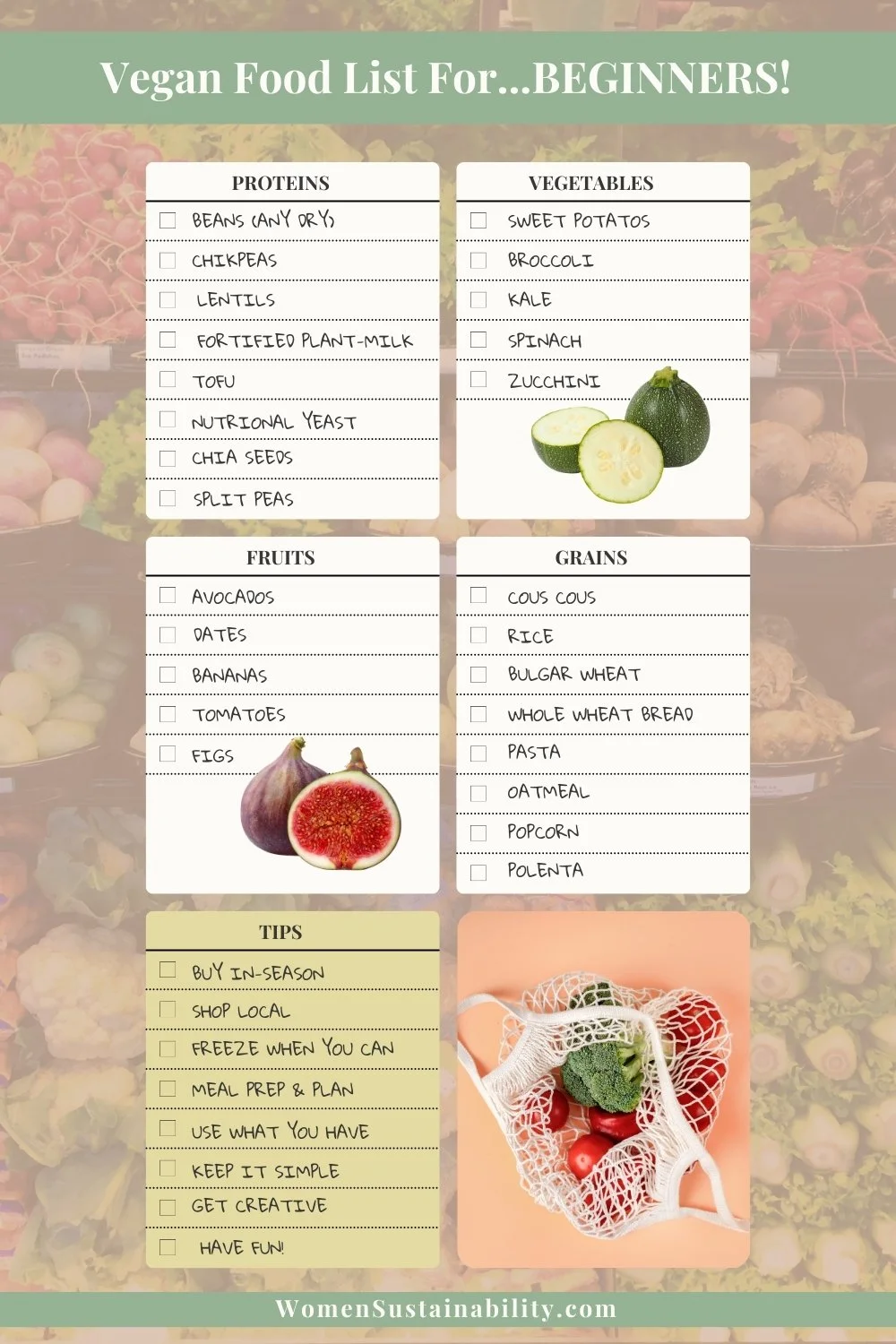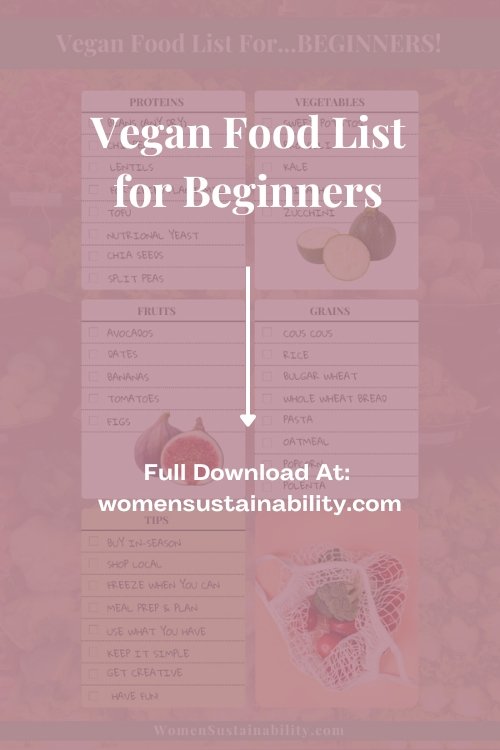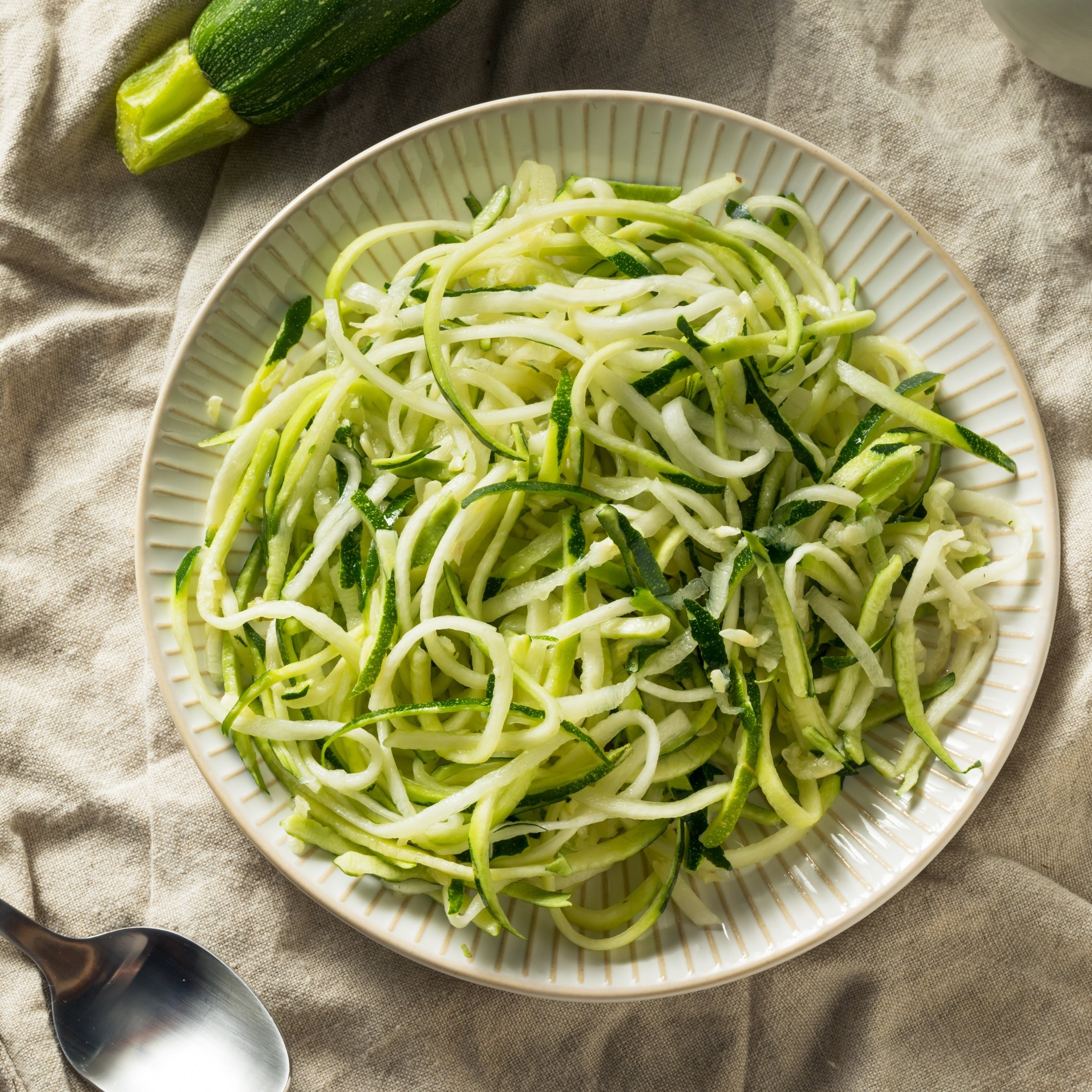Vegan Food List for Beginners (+ Recipes!)
by the W&S Sustainable and Mindful Living Team
SHARE ON:
DISCLAIMER: Please consult a qualified healthcare professional before starting any new health and wellness regimen. Always seek the advice of your physician or other qualified health provider with any questions you may have regarding a medical condition or dietary change. Never disregard professional medical advice or delay in seeking it because of information provided in this article. The content is for informational purposes only and should not be considered a substitute for professional medical advice, diagnosis, or treatment. Always consult with your healthcare provider to address any health concerns you may have. Before reading the following content, we also suggest reading our full disclaimer statement here.
Some of the links on this post might contain affiliate links. If you use any of these links to buy something we may earn a commission. For more information, please check out our disclosure statement. Thanks so much for supporting our free content!
We saw this amazing TikTok from @veganzinga(check out her content!) and got inspired to make this article about Celtic Salt.
@veganzinga How to find new dishes to make #newvegans #vegansupport ♬ Over the Moon - The Marías
In a world increasingly defined by conscious choices, the embrace of veganism signifies a profound shift towards a more compassionate, sustainable, and health-conscious lifestyle. For women, particularly those of color, this journey represents not only a commitment to personal well-being but also a stand for environmental responsibility and ethical consideration. This article serves as a comprehensive guide, offering a wealth of insights, information, and delectable recipes tailored to both newcomers and seasoned enthusiasts of plant-based living. From unraveling the profound health and environmental benefits to curating a list of essential vegan foods, our exploration is a compass for women embarking on a holistic approach to their dietary choices
In This Article
Not ready to read through just yet? No problem, save it on Pinterest!
Why a Vegan Diet Can be GREAT for You ( & The Planet!)
In an era marked by heightened awareness of the profound influence of dietary choices on health and the environment, the vegan lifestyle has emerged as a beacon of holistic well-being and ecological responsibility. Veganism transcends mere avoidance of animal-based products; it represents a seismic shift toward healthier living and the preservation of our planet's fragile ecosystems. For women, particularly those from diverse backgrounds, embracing a vegan diet can usher in a myriad of benefits that extend far beyond personal health.
Health Benefits
The health advantages of a vegan diet are firmly grounded in scientific research, rendering it an appealing choice for women keen on prioritizing their well-being. Empirical evidence underscores that a plant-based diet can significantly diminish the risk of chronic ailments, including cardiovascular diseases, type 2 diabetes, and certain forms of cancer. Women of color, who frequently grapple with pronounced health disparities, stand to gain substantially from the adoption of a vegan diet.
Plant-based diets are inherently rich in fiber, antioxidants, and an array of essential vitamins and minerals. These nutrient-dense foods not only bolster overall health but also yield remarkable benefits, from enhancing skin vitality to elevating energy levels. Weight management, often a paramount concern for many women, can be more effectively addressed through the adoption of a well-balanced vegan diet. Moreover, such diets can be strategically planned to provide essential nutrients like folate and iron, which play pivotal roles in women's reproductive health.
Wondering why you’re seeing ads? Check out our Disclosure Policy.
Environmental Impact
Beyond individual health, the pivotal role of veganism in advancing environmental sustainability cannot be overstated. The ecological ramifications of animal agriculture are staggering, encompassing deforestation, water pollution, and substantial greenhouse gas emissions. By embracing a vegan lifestyle, women can actively contribute to curtailing their carbon footprint.
Intriguingly, researchers such as J. Polish, acknowledge the long-standing presence of vegan dietary practices within several communities of color. African, Asian, and Latin American cuisines, for example, have rich traditions of plant-based dishes. This historical connection exemplifies the alignment between cultural heritage and ecological stewardship, offering women of color a unique opportunity to embrace a sustainable dietary approach rooted in tradition.
In conclusion, the adoption of a vegan diet by women, particularly those from diverse backgrounds, represents an empowering step toward robust personal health, cultural affinity, and global environmental preservation. As the world grapples with the imperatives of dietary transformation, the vegan lifestyle emerges as a potent instrument of positive change, offering women the agency to lead by example in forging a healthier, more equitable, and ecologically conscientious future.
Vegan Food List for Beginners: Grains
Grains are the cornerstone of many dietary traditions around the world, and for good reason. Backed by extensive research and scientific consensus, grains have earned their place as an essential component of a balanced diet. In this section, we delve into the profound significance of grains, especially within the context of a vegan diet. As we explore the transition from traditional Western diets, rich in animal products, to plant-based living, grains emerge as an indispensable ally. Moreover, we spotlight the diverse array of grains that offer health benefits, affordability, and culinary versatility in vegan cuisine.
The Role of Grains in a Diet
Grains, including staples like rice, wheat, and oats, have long been celebrated as nutritional powerhouses. Research conducted by leading health institutions consistently underscores their importance as primary sources of carbohydrates, fiber, vitamins, and minerals. The Dietary Guidelines for Americans, endorsed by the U.S. Department of Health and Human Services, emphasize the pivotal role of grains in a well-rounded diet. Grains are particularly lauded for their contribution to energy production, thanks to their carbohydrate content.
Grains in a Vegan Diet
For individuals transitioning from conventional Western diets to veganism, the inclusion of grains becomes a strategic necessity. Grains seamlessly fill the void left by animal products, providing the body with essential nutrients, including complex carbohydrates, proteins, and dietary fiber. They not only offer satiety but also serve as a foundation for balanced, plant-based nutrition.
Health benefits and uses of key grains you’ll find in most supermarkets:
Couscous: Couscous, a staple in North African cuisine, offers a rapid, versatile addition to vegan meals. Rich in selenium, it supports antioxidant function and aids in maintaining a healthy immune system. Try it in hearty salads or as a bed for savory stews.
Rice: Rice, with its diverse varieties such as brown, basmati, and jasmine, delivers essential carbohydrates and energy. It is a gluten-free option and a fantastic base for stir-fries, sushi, or pilafs.
Bulgur Wheat: A Middle Eastern favorite, bulgur wheat is a quick-cooking grain packed with fiber, vitamins, and minerals. It aids in digestion and is ideal for crafting nutritious tabbouleh salads or hearty soups.
Quinoa: Although technically a seed, quinoa boasts a complete protein profile, making it invaluable in a vegan diet. It offers a broad spectrum of amino acids and is a versatile ingredient for grain bowls, stuffed peppers, or breakfast porridge.
Popcorn: Surprisingly, popcorn can be a wholesome, whole-grain snack. It is a fiber-rich option, aiding in digestive health. When air-popped without excessive butter or oil, it becomes a guilt-free treat for movie nights.
In conclusion, grains stand as a cornerstone in any dietary plan, with particular significance in a vegan lifestyle. Their inherent health benefits, affordability, and adaptability make them indispensable allies in crafting nutritious and satisfying plant-based meals. Embracing the diverse array of grains not only supports individual well-being but also contributes to a sustainable, compassionate, and environmentally responsible food journey.
Wondering why you’re seeing ads? Check out our Disclosure Policy.
Vegan Food List for Beginners: Fruits
Fruits have been revered as sources of nourishment and vitality across diverse cultures and time periods. Their significance in our diet is deeply rooted in both tradition and scientific understanding. In this section, we explore the pivotal role that fruits play in nutrition, underscoring the importance of incorporating them into our daily meals. For individuals transitioning to a vegan diet from traditional Western eating patterns, which often include animal products, fruits are not just a choice but a nutritional imperative. We will delve into the unique contributions of fruits to a vegan diet and highlight specific varieties that offer an array of health benefits, affordability, and culinary versatility.
The Nutritional Powerhouse of Fruits
Fruits are celebrated in the realm of nutrition for their unparalleled richness in essential vitamins, minerals, dietary fiber, and antioxidants. Research conducted by esteemed institutiona, such as the Harvard T.H. Chan School of Public Health, underscores the profound health benefits associated with fruit consumption. Their studies have shown that regular fruit intake is linked to a reduced risk of chronic diseases, including heart disease, stroke, and certain types of cancer.
Fruits in a Vegan Diet
For individuals making the transition to a vegan lifestyle, fruits assume a paramount role in meeting dietary needs. They provide an abundance of vital nutrients that are essential for sustaining health and energy levels, compensating for the nutrients often obtained from animal products. Fruits are natural sources of vitamins, minerals, and antioxidants that are critical for the proper functioning of the body.
Wondering why you’re seeing ads? Check out our Disclosure Policy.
Health benefits and uses of key fruits you’ll find in most supermarkets:
Avocado: Often referred to as nature's butter, avocados are a nutritional powerhouse, providing healthy monounsaturated fats, potassium, and fiber. They are a creamy addition to salads, sandwiches, or simply spread on toast.
Dates: These naturally sweet gems are dense in nutrients, including potassium, magnesium, and dietary fiber. They make for an excellent natural sweetener in vegan desserts and energy bars.
Bananas: Rich in potassium and vitamins, particularly vitamin B6, bananas are an energy-boosting snack and a versatile ingredient for smoothies, vegan pancakes, or oatmeal.
Tomatoes: While technically a fruit, tomatoes are commonly used as vegetables in culinary contexts. They are loaded with lycopene, an antioxidant known for its potential health benefits. Tomatoes enhance the flavors of salads, sandwiches, and pasta dishes.
Figs: Figs offer a delightful blend of sweetness and earthiness, accompanied by a substantial dose of fiber, vitamins, and minerals. They make a scrumptious addition to vegan cheese platters, oatmeal, or desserts.
In conclusion, fruits are indispensable components of a health-conscious vegan diet, providing a wealth of nutritional advantages that support overall well-being. As individuals embrace the principles of veganism, they discover that fruits not only enhance the flavor and vibrancy of their meals but also contribute to a sustainable and compassionate lifestyle. Incorporating a colorful array of fruits ensures that the journey toward a healthier, eco-conscious, and ethically driven diet is both satisfying and nourishing.
Vegan Food List for Beginners: Vegetables
Vegetables, as you’re most likely already aware, hold an esteemed position in the realm of dietary choices. Their importance in our daily meals is rooted in a wealth of scientific research and nutritional wisdom that transcends cultures and generations. In this section, we delve into the profound significance of vegetables, elucidating their crucial role in fostering health and well-being. As we embark on the journey of transitioning to a vegan diet from conventional Western eating habits that often include animal products, vegetables emerge as non-negotiable cornerstones of our culinary choices. Furthermore, we'll spotlight specific vegetables renowned for their health benefits, affordability, and versatility in vegan cuisine.
The Nutritional Powerhouses of Vegetables
The nutritional value of vegetables is widely acknowledged and substantiated by extensive research conducted by reputable institutions such as the World Health Organization and the American Heart Association. Vegetables are cherished for their status as rich sources of essential vitamins, minerals, dietary fiber, and antioxidants. These nutritional attributes translate into a multitude of health benefits, including a reduced risk of chronic diseases, weight management, and overall well-being.
Vegetables in a Vegan Diet
For individuals embarking on the path to veganism, vegetables assume a role of paramount importance. They serve as a primary source of nutrients that are often obtained from animal products in conventional diets. In a vegan diet, vegetables take center stage, delivering an array of essential vitamins, minerals, and dietary fiber necessary for the body's optimal function.
Wondering why you’re seeing ads? Check out our Disclosure Policy.
Health benefits and uses of key vegetables you’ll find in most supermarkets:
Sweet Potatoes: Rich in vitamins A and C, fiber, and antioxidants, sweet potatoes are a versatile and budget-friendly choice. They can be baked, mashed, or roasted, offering a delightful addition to any vegan meal.
Broccoli: Renowned for its nutrient density, broccoli is an excellent source of vitamins K and C, as well as folate and fiber. It shines in stir-fries, roasted vegetable medleys, or as a simple steamed side dish.
Kale: Kale stands as a nutritional powerhouse, boasting vitamins A, C, and K, along with calcium and antioxidants. It can be used in salads, smoothies, or as a delectable addition to soups and stews.
Spinach: Abundant in iron, calcium, and vitamins A and K, spinach is a dietary must-have. It complements vegan pasta dishes, salads, and sautés splendidly.
Zucchini: Zucchini offers a dose of vitamins C and B6, as well as fiber. It serves as a versatile ingredient in vegan cooking, whether spiralized into noodles, grilled as a side dish, or incorporated into casseroles.
In conclusion, vegetables are indispensable assets in crafting a vibrant and healthful vegan diet. Their nutritional richness, cost-effectiveness, and culinary adaptability make them invaluable allies in embracing a plant-based lifestyle. As individuals make the conscious choice to adopt veganism, vegetables not only enhance the diversity and flavor of their meals but also play a pivotal role in fostering personal well-being and contributing to a more sustainable, compassionate, and environmentally responsible world.
Vegan Food List for Beginners: Proteins
Proteins, the fundamental building blocks of life, stand as one of the bedrocks of nutrition regardless of dietary choices. Their significance in our diet is underscored by a wealth of scientific research, expert consensus, and time-tested culinary wisdom. In this section, we delve into the pivotal role that proteins play in fostering health and vitality, emphasizing their importance as an essential component of any dietary regimen. For individuals transitioning to a vegan diet from traditional Western eating patterns, which often incorporate animal products, proteins become an even more vital consideration. We will explore the unique contributions of proteins to a vegan diet and spotlight specific plant-based sources that offer a plethora of health benefits, affordability, and culinary versatility.
The Vital Role of Proteins
Proteins, composed of amino acids, are the body's workhorses, participating in virtually every physiological process. Respected institutions like the Academy of Nutrition and Dietetics affirm the critical importance of proteins in maintaining and repairing tissues, supporting immune function, and aiding in the production of enzymes and hormones. Research consistently indicates that consuming an adequate amount of protein is vital for overall health and well-being.
Proteins in a Vegan Diet
In the transition to veganism, proteins become central to sustaining optimal health. They are essential for providing the body with the amino acids required for various bodily functions. A well-balanced vegan diet includes an array of plant-based protein sources that collectively meet protein needs and contribute to overall nutrition.
Follow us on:
Health benefits and uses of key proteins you’ll find in most supermarkets:
Beans: Beans, such as black beans, chickpeas, and kidney beans, are not only rich in protein but also packed with dietary fiber, vitamins, and minerals. They form the foundation of many vegan dishes, from hearty stews to protein-packed salads.
Chickpeas: Chickpeas, also known as garbanzo beans, are prized for their protein content and versatility. They can be used to create vegan staples like hummus, as well as added to curries, soups, and roasted snacks.
Lentils: Lentils are a superb source of plant-based protein, iron, and folate. They shine in vegan recipes such as lentil soups, stews, and vegan meatballs.
Fortified Plant Milk: Fortified plant milk, such as almond, soy, or oat milk, offers protein, vitamins, and minerals. It can be used in a wide range of vegan recipes, from cereal to smoothies, and even in savory dishes like vegan mac 'n' cheese.
Chia Seeds: Chia seeds are tiny nutritional powerhouses, loaded with protein, omega-3 fatty acids, and dietary fiber. They are an ideal addition to vegan breakfasts, sprinkled on oatmeal, yogurt alternatives, or incorporated into smoothies.
In conclusion, proteins represent a foundational pillar of any diet, and they are of paramount importance in a vegan lifestyle. Their unique contributions to health, sustainability, and culinary creativity make them indispensable in crafting nourishing, plant-based meals. As individuals embrace the principles of veganism, they discover that proteins not only play a pivotal role in their overall well-being but also contribute to a more compassionate, environmentally responsible, and ethically conscious world.
Vegan Food List for Beginners: Recipes for Getting Started
Ready to go vegan but don’t know where to start? Well, we suggest heading to the grocery store and getting started with the following staples:
Once you’ve got them, then perhaps, try checking out these recipes:
1.
Veggie Rice Bowls
@theres.food.at.home Meat or no meat? Reply to @sablewrld #foodtiktok #vegan #vegetarian #dinner #theresfoodathome ♬ original sound - There’s food at home
2.
Creamy Tofu Vegan Pasta
@browngirlvegan Wow this vegan creamy lemon pasta is literally ✨mindblowing✨ head to sitseasons.com to get yourself these convenient spice mixes🤌 | ad #lemonpasta #creamylemonpasta #schnitzel #tofurecipes #veganrecipes #veganfood #vegantiktok #pastatiktok #pastarecipe #foodtiktok #recipes ♬ Shut up My Moms Calling - (Sped Up) - Hotel Ugly
3.
Vegan Curry
@jessicainthekitchen Reply to @cmp715 coconut chickpea curry with garlic naan is an elite combo 🥺😍🫓🍛 #EasyRecipes #garlicnaan #plantbased #vegan #chickpeacurry #channamasala #jamaicancurry ♬ I Like - Guy
4.
Coucous Grain Bowl
@rivadivaa Easy grain bowl for lunch :), tastes better than it looks lol #plantbasedmealideas #veganrecipes #easyvegan #healthycooking #plantbasedrecipes ♬ Right Down the Line - Gerry Rafferty
5.
Vegan Kale Salad
@sugashani HIGH PROTEIN KALE SALADThis salad is fantastic, filling, and FULL of PROTEIN (25+ grams)......#kalesalads #vegansaladbowl #proteinsalad #veganproteinfood #veganproteinsources #plantbasedpower #plantbasedprotein🌱 #blackgirlmagic ♬ Love You So - The King Khan & BBQ Show











